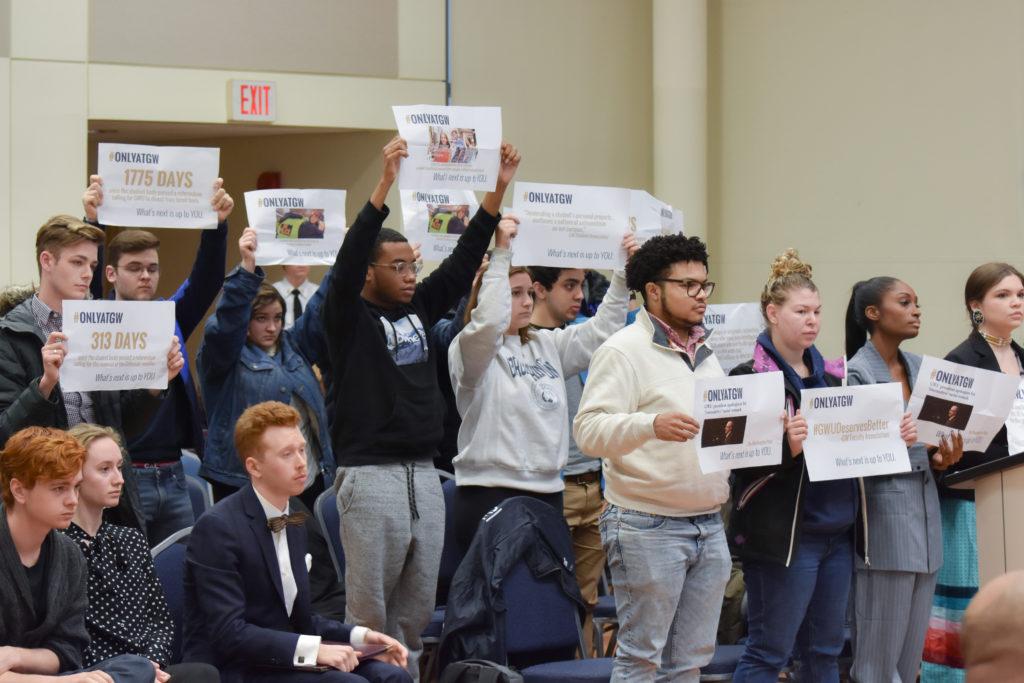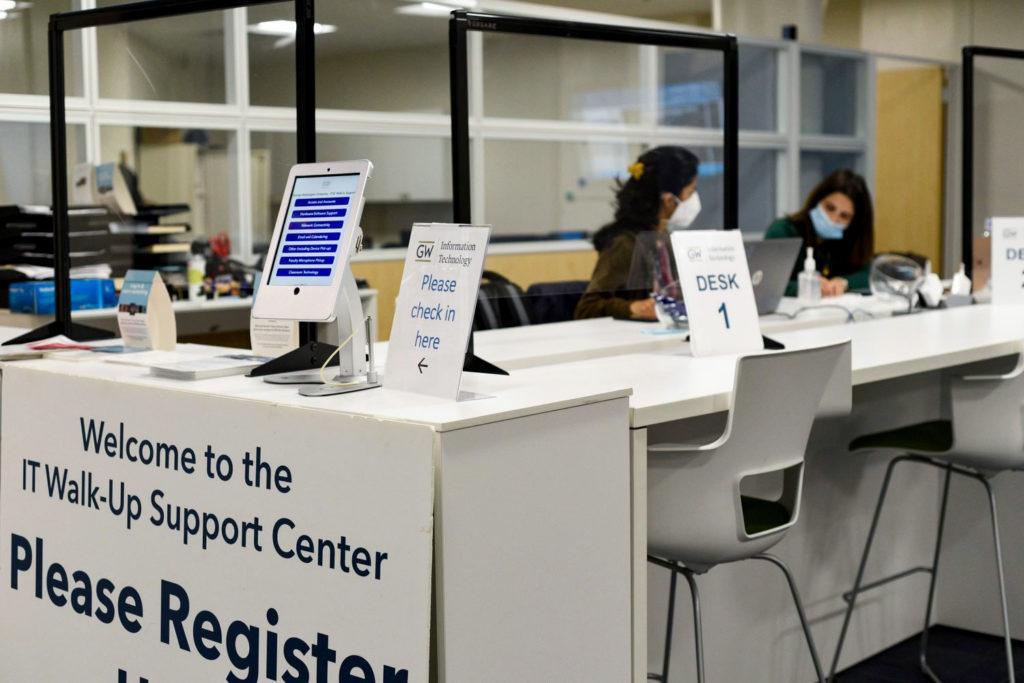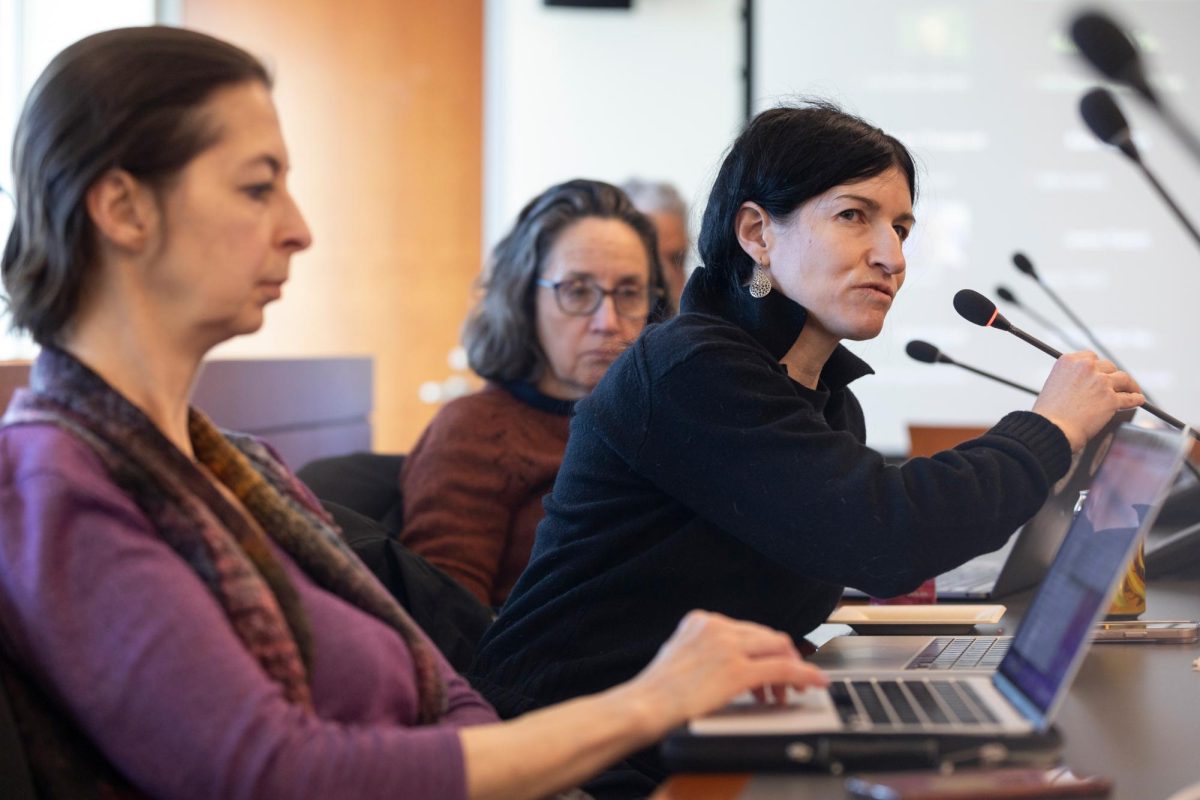The Board of Trustees has created a task force to manage its “environmental, social and governance responsibility” following a week of student protests condemning GW’s fossil fuel industry investments.
Board Chair Grace Speights said at the Board’s meeting Friday that the task force will provide the community with an “institutional statement of beliefs” and address a “broad range” of issues, and she will work with the Student Association, faculty and the GW Alumni Association to appoint members to the group. The board also approved next year’s tuition and housing costs and an updated nepotism policy at its meeting.
Speights announced the creation of the task force, which will be chaired by trustee Peter Harrison, to about 25 students who attended the meeting holding signs with phrases like “#GWUDeservesBetter” and “What’s next is up to YOU.” Speights invited Archer Gallivan, a sophomore and member of Sunrise GW, to speak at the meeting on behalf of the student activists.
“While we are sincerely grateful for the platform you’ve given us today, being quiet is simply not an option for us,” Gallivan said at the meeting. “We will continue to make our voices heard until the moment you tell us you will divest – until you show us that this University respects the lives of its students and of this planet we share.”

Olivia Columbus | Design Editor
A video Gallivan posted last week showing University President Thomas LeBlanc making a racially “insensitive” comparison on video when discussing divestment with a member of Sunrise GW led LeBlanc to apologize at the Board meeting for his remarks. LeBlanc also apologized for his comments the day after the video surfaced.
“I’ve been reflecting on this during the week,” LeBlanc said at the meeting. “I’m most sorry for the fact that I’m aware of the burden that students of color carry on this campus, and adding one ounce to that burden is my deep regret.”
The Board’s decision to create an ESG task force to measure the University’s impact comes after a week of student activism on climate change. Members of Sunrise GW protested an event Tuesday celebrating the 10th anniversary of the Regulatory Studies Center, which has been accused of harboring an anti-regulatory stance, and about 70 students rallied Wednesday for divestment outside LeBlanc’s residence on campus, the F Street House.
Sunrise GW called for the University to divest from its fossil fuel holdings in a letter late last year, which also asked officials to either cut ties with or become more transparent about donations to the RSC.
The activist organization released a statement following the Board’s announcement in which members stated they were “disappointed” by the task force, which they characterized as an inadequate solution to a pressing issue.
“The moral imperative of divestment is clear and does not need a moment’s thought as to whether or not it is actively contributing to the degradation of our planet,” the statement reads. “Whatever exploration the University seeks to embark on has been conducted by the countless other institutions that have already divested.”
The creation of the task force also comes days after Georgetown University’s student newspaper, The Hoya, reported that Georgetown officials have announced plans to divest from the fossil fuel industry, joining institutions like the University of California system.
SA President SJ Matthews expressed her frustration to trustees on a number of issues at the meeting, including the “broken” trust between students and administrators. She added that she was frustrated that student protesters had to “put themselves in harm’s way” and that “the people who are charged with protecting the GW community were the ones to harm them.”
Matthews’s remarks appeared to reference an incident involving a GW Police Department officer who was placed on administrative leave after he appeared to push a student protester down a flight of stairs.
“I am frustrated that time and time again the student voice is met with silence by the GW administration,” Matthews said. “I am frustrated that all too often my weekends and nights are spent drafting statements condemning things like racism and anti-Semitism only to be met with University silence.”
LeBlanc said in an interview that he “appreciated everything” Matthews said during the meeting, and he will work to fix lapses in communication between administrators and the student body.
“An apology is a first step and I understand that,” he said. “I was just saying we have a lot of work to do, particularly to help students of color feel more included in this community. I hear that loud and clear and I know we’ve got a lot of work to do, and we’re going to work on it.”
In addition to announcing the task force, trustees approved revisions to a policy on nepotism and personal relationships which was last revised more than a decade ago. The new revisions clarify the definition of related parties to encompass those in a relationship or living in the same household.
The revisions also specify employees’ obligations to report potential nepotism and the process of addressing instances when the involved parties are in a “supervisor-to-subordinate relationship.” The Board’s committee on audit and compliance reviewed the policy following the 2018 adoption of a policy banning student-faculty relationships.
LeBlanc said administrators have met with the final candidates for the law school dean position and will announce the new dean “very soon.” Interim Dean Christopher Bracey has served as the law school’s chief since Blake Morant’s departure at the end of the 2018-19 academic year.








